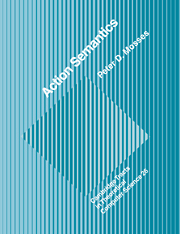Book contents
- Frontmatter
- Contents
- List of Boxes
- Preface
- Part I Introduction
- Part II Action Notation
- Part III Semantic Descriptions
- Part IV Conclusion
- Appendices
- Appendix A AD Action Semantics
- Appendix B Action Notation
- Appendix C Operational Semantics
- Appendix D Informal Summary
- Appendix E Data Notation
- Appendix F Meta-Notation
- Appendix G Assessment
- Bibliography
- Symbol Index
- Concept Index
Appendix C - Operational Semantics
Published online by Cambridge University Press: 19 January 2010
- Frontmatter
- Contents
- List of Boxes
- Preface
- Part I Introduction
- Part II Action Notation
- Part III Semantic Descriptions
- Part IV Conclusion
- Appendices
- Appendix A AD Action Semantics
- Appendix B Action Notation
- Appendix C Operational Semantics
- Appendix D Informal Summary
- Appendix E Data Notation
- Appendix F Meta-Notation
- Appendix G Assessment
- Bibliography
- Symbol Index
- Concept Index
Summary
The abstract syntax of a kernel action notation is the basis for its formal semantic description. The full action notation can be reduced to the kernel by using some of the algebraic properties specified in Appendix B.
The specification of semantic entities shows what kind of states are needed to support action performance.
The structural operational semantics of action notation gives the formal definition of action performance.
The definition of observational and testing equivalence on actions relates the operational semantics of action notation to the algebraic properties specified in Appendix B.
The standard action notation used in action semantics allows direct expression of control, dataflow, scopes of bindings, changes to storage, and communication between distributed agents. It is therefore to be expected that this Appendix, which contains its complete operational semantic description, makes a formidable document. The modular structure is shown on the next page. The modules are followed by the definition of observational and testing equivalence.
Whereas standard action notation is semantically rich, the kernel of action notation is syntactically of only moderate size. This is revealed by the grammar specifying the abstract syntax of the kernel. There are eight fundamental binary combinators, and four hybrid combinators. Disregarding the unfolding notation used to abbreviate infinite action terms, there are only two unary combinators in the kernel.
- Type
- Chapter
- Information
- Action Semantics , pp. 278 - 295Publisher: Cambridge University PressPrint publication year: 1992



